Baker Academic Theological Interpretation Collection (16 vols.)
Digital Logos Edition
Overview
The Baker Academic Theological Interpretation Collection contains 16 volumes of recent, in-depth scholarship from today’s top thinkers, including I. Howard Marshall, Joel B. Green, Markus Bockmuehl, Richard S. Briggs, and Craig G. Bartholomew. It provides insight on foundational theological topics like healing, interpretive issues, dogmatics, biblical placement, and the relationship between Old Testament themes and New Testament messages.
Seven volumes are part of the Studies in Theological Interpretation Series—a collection dedicated to pursuing constructive theological interpretation. These volumes tackle topics like vision-reports, humanity, Psalms as ethical instruction, contemporary New Testament studies, the significance of prophetic literature, and more. Additionally, the Dictionary for Theological Interpretation of the Bible rounds out your study as a strong reference work in theological theory, hermeneutics, and history.
- Provides insights on various theological topics
- Contains recent scholarship from contemporary scholars
- Enhances your understanding of theological interpretation
- Title: Baker Academic Theological Interpretation Collection
- Publisher: Baker Academic
- Volumes: 16
- Pages: 4,416
- Resource Types: Topical, Synopsis/Survey
- Topics: Interpretation and Theology
- Healing in the Bible: Theological Insight for Christian Ministry by Frederick J. Gaiser
- Holy People, Holy Land: A Theological Introduction to the Bible by Michael Dauphinais and Matthew Levering
- Practicing Theological Interpretation: Engaging Biblical Texts for Faith and Formation by Joel B. Green
- Reading Scripture with the Church: Toward a Hermeneutic for Theological Interpretation by A. K. M. Adam, Stephen E. Fowl, Kevin J. Vanhoozer, and Francis Watson
- Scripture’s Doctrine and Theology’s Bible: How the New Testament Shapes Christian Dogmatics by Markus Bockmuehl
- Where Mortals Dwell: A Christian View of Place for Today by Craig G. Bartholomew
- And I Turned to See the Voice: Rhetoric of Vision in the New Testament by Edith M. Humphrey
- Body, Soul, and Human Life: The Nature of Humanity in the Bible by Joel B. Green
- The Character of Christian Scripture: The Significance of a Two-Testament Bible by Christopher R. Seitz
- Psalms as Torah: Reading Biblical Song Ethically by Gordon J. Wenham
- Prophecy and Hermeneutics: Toward a New Introduction to the Prophets by Christopher R. Seitz
- Seeing the Word: Refocusing New Testament Study by Markus Bockmuehl
- The Virtuous Reader: Old Testament Narrative and Interpretive Virtue by Richard S. Briggs
- Beyond the Bible: Moving from Scripture to Theology by I. Howard Marshall
- Introducing Theological Interpretation of Scripture: Recovering a Christian Practice by Daniel J. Treier
- Dictionary for Theological Interpretation of the Bible edited by Kevin J. Vanhoozer
This title is included in the following collections
You can save when you purchase this product as part of a collection.
 Baker Academic Theological Int...$414.99$414.99
Baker Academic Theological Int...$414.99$414.99Baker Academic Biblical Studie...
$3,999.99$3,999.99Baker Ultimate Collection 2022...
$38,273.89$30,599.99
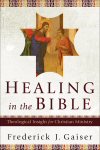
What does the Bible say about healing? In this volume, respected biblical scholar Frederick Gaiser offers a close theological reading of biblical texts on health and healing, that engage questions of contemporary theological and pastoral concern. Gaiser considers 15 key Old and New Testament passages, examining their significance for the church’s understanding of healing and its ministry today. He explores issues such as God’s role in healing; the relationship between healing and prayer; the place of healing in biblical theology; God’s healing and medical science; the healing work of Jesus; healing, salvation, and cure; the relationship between sickness and sin; and healing under the sign of the cross. The final chapter draws together insights from the various chapters and summarizes Gaiser’s findings.
Healing in the Bible offers fresh insights for anyone interested in Christian views on healing, from professors and students in Bible, theology, and pastoral ministry courses to thoughtful lay readers and pastors.
Frederick Gaiser has written a book that everyone interested in the intersection of theology and health needs to read. This is the work of a skilled exegete who is intimately familiar with the biblical stories of God’s healing acts. Gaiser reminds us that all of our theological reflection concerning health ought to begin with and account for the biblical narrative. I look forward to the opportunity to use this book in my own teaching and scholarship.
—Joel James Shuman, professor of theology, King’s College
Frederick Gaiser has a great instinct and gift for moving to and fro in the space between the contemporary world and the biblical text. He began this book in Africa, and although he does not keep referring to that, one can see the way it shaped and resourced the ‘conversation’ between our contemporary world(s) and the Bible’s world. He keeps chewing at the text, seeking to be fully open to it, precisely because it comes from a different world and thus has the power to illumine our world. Every chapter is illuminating.
—John Goldingay, David Allan Hubbard Professor of Old Testament, Fuller Theological Seminary
What an enormous grasp of issues of health Frederick Gaiser demonstrates in this book as he moves easily between stories of Zimbabwe, biblical exegesis, and applications for twenty-first-century Christians. Gaiser’s volume on the wide variety of literature in the Bible about healing is obviously the result of many years of committed research and contemplation; readers will be amazed at the range of his erudition and the depth of his faith. I am very grateful for his insightfully inspiring work.
—Marva J. Dawn, teaching fellow in spiritual theology, Regent College
Fred Gaiser herein offers a collection of insightful essays on the difficult issues related to healing. These chapters bear the marks of long and deep reflection. Students and professionals alike will benefit from these close and clear studies. They ring true to the scriptural texts, are sensitive to the pastoral context, and bring a sure theological hand throughout.
—Terence E. Fretheim, Elva B. Lovell Professor of Old Testament, Luther Seminary
With his careful analysis of healing stories in the Bible, Professor Gaiser has given us a great gift. He reminds us that healing is always tied up in the mystery and wonder of relationships—with our self, with our community, and with God–and that health depends on the wholeness of both individuals and communities. As we work to reform and improve health care in America, we would do well to keep these lessons in mind.
—James F. Hart, adjunct assistant professor, School of Public Health, University of Minnesota
This is an excellent work that reflects on healing in the Bible and its potential meaning for the healing ministry today. . . . [Gaiser] draws a summary of the fundamental principles and values about healing that are reflected in the Scriptures and connects them in a thoughtful and practical way to the Christian ministry of healing today, both in its professional and scientific expressions and in more ordinary therapeutic encounters.
—The Bible Today
Gaiser generates lively exegetical conversations by offering fresh insights on tough questions. . . . Given the current political tensions from health care to global suffering, Gaiser produces a careful, balanced, and imaginative work for anyone interested in Christian views of healing.
—Religious Studies Review
Frederick J. Gaiser is a professor of Old Testament at Luther Seminary, where he has taught for more than 30 years. He is also the editor of Word & World, one of the top theological journals in North America.
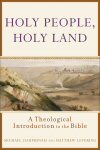
The second-century heretic Marcion believed it was impossible to reconcile the Old Testament message of Law and sacrifice with the New Testament message of grace and forgiveness. Even today, many believers struggle to find unifying themes in Scripture that can make sense of its great diversity.
Dauphinais and Levering suggest that holiness—that is, love as communion with God and neighbor—is the common thread that runs through Scripture. Holiness, they say, manifests itself in profuse biblical language about a promised land and a holy people, all of which reveals a holy God desiring to recreate us in his image. The authors point out that this idea is as old as the church itself and as new as the work of contemporary biblical scholars.
Holy People, Holy Land is a mind-expanding journey through the Bible. The authors reveal that the Old Testament themes of land and Law, temple and covenant, all begin and end with God’s gracious saving work in Christ, who fulfills the Law, establishes perfect justice, and is the true Temple.
This book is intended for undergraduate students in theology and the Bible, both Catholic and Protestant, who seek to learn the story of how love—revealed most prominently in the sacrifice of Christ—creates a holy people equipped to serve God and one another.
Michael Dauphinais and Matthew Levering’s reading of the Bible from Genesis to Revelation provides a much-needed focus on Scripture’s theological meaning as a basis for instruction in Christian doctrine. Inspired by St. Augustine, Dauphinais and Levering read the Bible theologically. Following Augustine’s catechetical approach to the Bible (as distinct from a ‘biblical theology’), the authors illuminate central points rather than get lost in the myriad biblical details. They seek the ‘meaning of God’s plan for human history as revealed in the Bible.’ Written from a Catholic catechetical and theological perspective but informed by sound ecumenical exegesis, this book will nourish one’s Christian faith in the biblical story and perspective on reality in response to today’s dominant secularistic, ideological, or relativistic worldviews. It will also whet readers’ appetites to go to the Bible for further nourishment by God’s Word.
—William Kurz, professor, Marquette University
[The authors] consider holiness—defined as a condition of balance and innocence before God and his creation—to be the underlying theme of all Scripture. As such, it provides a paradigm for God’s intervention in human affairs, unifying sacred history as the record of God’s reaching out to a world in need of grace. The authors . . . [focus] on the biblical stories as reflections of God’s hand in human affairs. As the title suggests, they chart a pattern of holiness, not just in people, but in the land the people possess. . . . Although written for undergraduate theology students . . . the material is easily grasped by the average reader and is highly recommended for Catholics and Protestants alike.
—Publishers Weekly
Beginning with Genesis and moving through Revelation, the authors show that the Bible focuses on holiness, envisioned as love of God and neighbor. Reading in this light, they explore how themes in the Hebrew Bible—such as covenant, land, law, and temple—all contribute to shaping the people of Israel in holiness. . . . This eminently readable work of conservative Catholic scholarship is recommended for theological libraries, undergraduate libraries, and larger public library religion collections.
—Library Journal
Each chapter skillfully weaves the covenantal promises and blessings to God’s people progressively through the unfolding of Scripture. . . . The authors support their arguments with considerable footnotes that include early classics such as Aristotle, Athanasius, Augustine, Bernard of Clairvaux, and Thomas Aquinas, but also more recent sources such as N. T. Wright, Dietrich Bonhoeffer, and John Paul II. . . . This work proved to be challenging and provocative. . . . Holy People, Holy Land is an engaging worthwhile investment, especially for any conservative evangelical Protestants who need a better understanding of contemporary Roman Catholic theological works.
—Journal of the Evangelical Theological Society
The authors have read widely, showing acquaintance with the biblical theological works of Romanist and non-Romanist alike. . . . While they are familiar with the more critical tradition of scholarship, they do not get sidetracked in their reading. . . . Holy People, Holy Land is a well-written, helpful review or survey of Israel’s history. But it is much more than that. It serves as a sometimes almost devotional discourse that continually pulls together Old Testament revelational elements and themes . . . and connects them with fulfillment in Jesus Christ and the Christian church of the New Testament redemptive era. . . . Preachers would benefit in reading many portions of Holy People, Holy Land, especially the chapters dealing with Old Testament material. . . . A useful index concludes [this book].
—Mid-America Journal of Theology
Michael Dauphinais is dean of faculty at Ave Maria University in Naples, Florida.
Matthew Levering is a professor of religious studies at the University of Dayton in Dayton, Ohio. He is the author or editor of numerous books, including Ezra & Nehemiah in the Brazos Theological Commentary on the Bible.
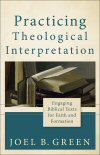
Much is written about the theory of theological interpretation, but how does it function when it comes to actually working with biblical texts? This volume shows that theological interpretation is not so much an exegetical method as it is a practice concerned with Scripture’s role in the faith and formation of persons and ecclesial communities. Biblical scholar Joel Green demonstrates both the practice of theological interpretation and the fruitfulness of this approach to reading biblical texts, providing students with helpful ways of wrestling with knotty interpretive issues. He also explores how theological inquiry can coexist with rigorous academic study of the Bible.
For many years Joel Green has been a leading advocate for interpreting Scripture theologically. In this short volume all of his wide learning is on display as he deftly works his way through some of the contested issues surrounding theological interpretation of Scripture. This volume represents a wonderfully accessible window into theological interpretation by one of its most accomplished practitioners.
—Stephen Fowl, professor of New Testament, Loyola University Maryland
In a compact and carefully argued presentation, a prominent New Testament scholar shares his convictions about proper apprehension of the New Testament’s word of address. This serves as an introduction to many of the key points of critical evaluation in what is now called theological interpretation. He helpfully locates the theoretical discussion of narrative, the ‘model reader,’ history, and the Rule of Faith in relationship to the reading of New Testament texts. Informed, engaged, accessible.
—Christopher Seitz, professor of biblical interpretation, Wycliffe College, University of Toronto
I warmly welcome Joel Green’s book on the theological interpretation of Scripture. Contributions have already been made to this area, but this is the most mature, careful, and well read to date. Biblical studies is in the process of exploring paradigms beyond historical-critical methods (plural). The most recent are reception history and theological interpretation. Green seeks to hear the voice of God through Scripture, which, after all, is the main task of exegesis. This book will also help to span the gulf between theologians and exegetes.
—Anthony C. Thiselton, former head of theology, University of Nottingham
Joel Green’s Practicing Theological Interpretation charts a way through the thickets of interpretive theory and practice for those who are committed to the role of Scripture in the faith and formation of persons and ecclesial communities. Chapters devoted to the role of the reader, the Rule of Faith, and historical study model both critical theoretical reflection and practical implementation, offering concrete interpretations of various biblical texts. Stimulating, learned, and timely, Green’s essays provide guidance for those who desire to harvest the fruit of biblical scholarship for nourishing the formation of Christian faith and practice.
—Marianne Meye Thompson, George Eldon Ladd Professor of New Testament, Fuller Theological Seminary
Joel Green’s Practicing Theological Interpretation testifies to his deep engagement with the past 20 years of this important movement in contemporary biblical interpretation. He gently introduces the topic to beginning readers, reminds intermediate readers of nuances they may have missed (and rewards them with instructive readings of exemplary biblical texts), and for advanced audiences he marks out a clear summary of his approach as a landmark for further exploration. Green’s valuable contribution to the discussions of biblical theology and theological interpretation should draw in a new generation of practitioners for his approach to attaining vibrant, convincing, compelling readings of the Bible.
—A. K. M. Adam, lecturer in New Testament studies, University of Glasgow
Joel B. Green is a professor of New Testament interpretation and associate dean of the Center for Advanced Theological Studies at Fuller Theological Seminary in Pasadena, California. He is the author or editor of numerous books, including Dictionary of Scripture and Ethics, Dictionary of Jesus and the Gospels, Introducing the New Testament, and commentaries on Luke and 1 Peter. He is also editor-in-chief of the Journal of Theological Interpretation.
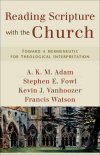
Reading Scripture with the Church is the result of years of debate and discussion among four leading scholars of biblical interpretation. In this volume, ideal as a supplementary hermeneutics textbook, each of the four contributors offers insights on his particular theory of theological interpretation of Scripture.
A. K. M. Adam suggests that interpreters break free from the constraining effects of approaching interpretation as translation, embrace the abundance of meaning in Scripture, and envision biblical theology as “signifying practice.” Stephen Fowl interacts with Thomas Aquinas’ interpretive practice and advocates a model of “bounded plurality” of meaning in the “literal sense” of Scripture that should inform our hermeneutical judgments. Kevin Vanhoozer describes a method of theological interpretation based on viewing the Bible as God’s communicative action, given with a certain intention and given to elicit a certain response from the reader. Francis Watson adopts the single identity of Jesus Christ, as revealed in the four Gospels, as a hermeneutical model describing the possibility and limits of plurality in interpretation.
Each author also responds to the other three. Points of agreement are affirmed, and disagreement clarified. The goal is to lead students to embrace the task of theological interpretation with energy, caution, and precision.
These elegant scholarly essays by four of the leading advocates for theological interpretation of Scripture in the church are a splendid intervention in current debates about the nature, settings, and ends of biblical interpretation and deserve to be pondered by all who are interested in the place of Scripture in church and theology.
—John Webster, chair of systematic theology, University of Aberdeen
The four interactive essays in this book are an important step in the effort to move biblical interpretation forward. The authors invite us to move from an excessive reliance on particular historical methods to an integration of these with the theological practices and insights of God’s people from the past and present. The book signals an ecumenical optimism springing from what has already been achieved and points out ways to bring about a deeper joy in ‘the encouragement of the Scriptures’ and a closer union with the center of unity, Jesus Christ, who is still, in the power of the Holy Spirit, making himself known in and through his church.
—Francis Martin, professor of sacred Scripture, Sacred Heart Major Seminary
The significance of this project is its juxtaposition of contributions from four major voices in recent theological hermeneutics. . . . Reading Scripture with the Church thus provides a handy entry-point into . . . what is now an expanding conversation around theological hermeneutics of Christian Scripture.
—Review of Biblical Literature
Four scholars, two from New Testament studies and two from theology itself, have each contributed an essay addressing some aspect of the theological interpretation of the Bible. . . . The authors’ closing responses invite the reader into the dialogue that has engaged these theologians for several years. Both biblical scholars and theologians will find this book of interest.
—Bible Today
The essays and responses in this volume bear witness to what is an encouraging renewal of an approach to the Bible that has much significance for church life and may restore balance in academic biblical study. The four authors are good representatives of this development. . . . All the essays and responses are thoughtful and stimulating.
—Catholic Biblical Quarterly
A. K. M. Adam is a lecturer in New Testament studies at the University of Glasgow.
Stephen E. Fowl is a professor of New Testament at Loyola University Maryland.
Kevin J. Vanhoozer is Blanchard Professor of Theology at Wheaton College Graduate School in Wheaton, Illinois. He is the author or editor of many books, including Everyday Theology, Is There a Meaning in This Text?, and the award-winning Dictionary for Theological Interpretation of the Bible.
Francis Watson is is a professor in the Department of Theology and Religion at Durham University.
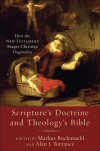
Recent years have seen a growing interest (not to mention a growing body of literature) in the intersection of biblical studies and theology. Scripture’s Doctrine and Theology’s Bible stems from an illuminating symposium held at the University of St. Andrews that assembled a group of world-class biblical and systematic theologians to answer this fundamental question: To what extent, and on what grounds, does the New Testament shape and prescribe Christian theology?
As the contributors explore this question, they address the specific way in which the New Testament does or should shape dogmatics. Part 1 deals with how the Bible informs particular aspects of Christian doctrine and praxis. Part 2 examines how the New Testament has shaped influential theologians of the past century. Part 3 moves from analysis to synthesis, drawing a vision for the New Testament’s normative role in forming theology and ethics. Here is engaging dialogue for scholars in both biblical studies and theology, as well as their students.
Just as a skillfully crafted mosaic, with an assortment of variously shaped tesserae, portrays an aesthetic image, so, too, this unified work of diverse essays presents a panoptic display of theological interpretation, illuminating the depth of and pervasive interest in this growing field. Every page of this book exudes with the erudition of leading biblical and systematic scholars.
—Theological Book Review
This collection of essays brings together the views of Christian exegetes and theologians . . . from various perspectives, and it makes a solid contribution to the ongoing project of ‘theological interpretation.’
—Catholic Biblical Quarterly
This excellent edited volume contributes to the growing discussion on the intersection between biblical studies and systematic theology. . . . Contributors include Bockmuehl, Torrance, Vanhoozer, Wright, Webster, and several other top scholars. The book is aimed at scholars and students within biblical studies and theology and succeeds admirably. . . . [A] fertile interdisciplinary conversation.
—Religious Studies Review
These thoughtful papers, in various ways, all contribute to a lively and ongoing discussion about interpreting Scripture theologically. . . . Each of these essays is strong in its own right. . . . For the most part these essays are not conceptually connected to each other. There is something important about publishing them together, however. A set of essays such as this show that certain arguments about interpreting Scripture theologically can now be taken as settled. . . . These essays testify to a relative level of confidence and maturity as theologians and biblical scholars begin to converse over specific issues of mutual concern without having to perform a lot of conceptual and disciplinary ground-clearing.
—Modern Theology
In these pages, some of the most exciting names in contemporary theology take turns answering the question, ‘To what extent, and on what grounds, does the New Testament shape and prescribe Christian theology?’. . . This scholarship models to great effect the move beyond past parochialisms to a healthier and more promising relationship between biblical studies and systematic theology.
—Scottish Bulletin of Evangelical Theology
Markus Bockmuehl is a professor of biblical and early Christian studies at Keble College, University of Oxford. He previously taught at the University of Cambridge and the University of St. Andrews. Bockmuehl is the author or editor of numerous books, including Seeing the Word, Paradise in Antiquity: Jewish and Christian Views, and Redemption and Resistance: The Messianic Hopes of Jews and Christians in Antiquity.
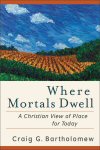
Place is fundamental to human existence. However, we have lost the very human sense of place amid the time-space compression characteristic of postmodernity and globalization. Craig Bartholomew provides a biblical, theological, and philosophical grounding for place in our rootless culture and articulates a hopeful Christian vision of placemaking for today’s world. He illuminates the importance of place throughout the biblical canon, in the Christian tradition, and in the contours of contemporary thought. Where Mortals Dwell will be of interest to professors and students in Bible, culture, environment, and practical theology courses, as well as thoughtful laity and pastors interested in place and related environmental themes.
This study in theology that builds from a biblical base and moves to discussions of urban planning, biotic community, and pilgrimage—and even includes maps—may well be unprecedented. The very fact that this assemblage of concerns comes as a surprise to the reader points to the need for this study of what it means to come before God in our places.
—Ellen F. Davis, Amos Ragan Kearns Professor of Bible and Practical Theology, Duke Divinity School
Craig Bartholomew’s Where Mortals Dwell: A Christian View of Place for Today is a stunning achievement. The book masterfully surveys the role of place in the Bible, helpfully looks at the role place has played in the Western philosophical tradition, and concludes with satisfying advice, both theoretical and practical, as to how contemporary Christians should think about place as they engage in the crucial work of placemaking. It is rare to find an author with such command of biblical, theological, and philosophical issues, who provides original, powerful ideas delivered in clear, sparkling prose.
—C. Stephen Evans, distinguished professor of philosophy and humanities, Baylor University
In this ambitious new book Craig Bartholomew has assembled a remarkable range of ideas and resources for the work of making our world a place that glorifies God. Drawing on scholarship in biblical studies, theology, philosophy, and cultural studies, Bartholomew advances distinctly Christian thinking about place in a significant way.
—Norman Wirzba, research professor of theology, ecology, and rural life, Duke Divinity School
Place affects us all, but reflections about its significance are scarce—especially thoroughly Christian reflections. This outstanding book therefore deserves your attention. The entire teaching of the Bible about place is represented here in one fascinating overview followed by an intriguing confrontation with Western philosophical thought on matters of place. Where Mortals Dwell is a brilliant survey of the liberating Christian concept of placemaking.
—Bob Goudzwaard, professor emeritus of economics and social philosophy, Free University of Amsterdam
This is a major work of theological rediscovery in which Craig Bartholomew imaginatively reconstructs a Christian view of human implacement. Bringing biblical, philosophical, and theological perspectives to bear, he explores unexpected aspects of implacement with ventures into ornithology, building, gardening, and the home. Where Mortals Dwell is an erudite, readable, original, and fascinating invitation to a theology and spirituality of place.
—Gordon McConville, professor of Old Testament theology, University of Gloucestershire
Craig G. Bartholomew is professor of philosophy and religion and theology at Redeemer University College in Ancaster, Ontario, where he holds the H. Evan Runner Chair. He is the author of Ecclesiastes in the Baker Commentary on the Old Testament Wisdom and Psalms series, an associate editor of Dictionary for Theological Interpretation of the Bible, and the coauthor, with Michael W. Goheen, of The Drama of Scripture and Living at the Crossroads.
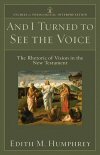
Although they do not constitute a dominant genre, vision-reports—such as those surrounding the nativity, the transfiguration and resurrection, Stephen’s martyrdom, and Jesus’ appearance to Saul—appear at crucial moments in numerous New Testament texts. Surprisingly, however, they have occasioned few detailed studies.
Edith Humphrey’s careful work neatly fills that gap in the scholarly literature. By means of a literary and rhetorical approach, Humphrey offers new insights into the use of vision-reports, moving beyond previous studies that have tended to focus only on the recorded event (what actually happened?) to the deeper polemic, literary, and theological dimensions (how and to what end do the authors embed the vision-report in their writings?).
Humphrey details four uses of vision-reports: to complete the narrative, to direct the argument, to shape the narrative, and to fire the imagination. Taking the cue from these narratives, which are at once “open” and “undirective,” she commends a hermeneutics of receptivity to the reader.
The argumentative and aesthetic contribution of vision-reports to persuasion in biblical texts is an exciting area of investigation, one in which Edith Humphrey has already distinguished herself. Her literary skill is evident in the ways in which she, as a sensitive reader of texts, invites us to be more attentive and engaged readers ourselves as well as in the ways her own winsome style encourages us to read both the texts and her observations on them with a ‘hermeneutics of welcome’ rather than the customary ‘hermeneutics of suspicion.’
—David A. deSilva, Trustees’ Professor of New Testament and Greek, Ashland Theological Seminary
Humphrey surprises us with her ability to lift the veil from the mysterious vision-reports of the New Testament. She clarifies how the words and images of vision-reports work together to create the rhetoric of sacred texts. Humphrey has brought the vision-reports of the New Testament into full conversation with rhetoric and hermeneutics in a whole new way. She has produced a delightful work of great imagination and powerful argumentation in its own right.
—Duane F. Watson, professor of New Testament studies, Malone University
Edith M. Humphrey is the William F. Orr Professor of New Testament Studies at Pittsburgh Theological Seminary. She is the author of several books, including Ecstasy and Intimacy: When the Holy Spirit Meets the Human Spirit.
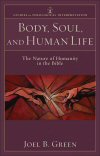
Are humans composed of a material body and an immaterial soul? This view is commonly held by Christians, yet it has been undermined by recent developments in neuroscience. How much of Christian theology is built on views of humanity that modern science has proved to be untenable?
Exploring what Scripture and theology teach about issues such as being in the divine image, the importance of community, sin, free will, salvation, and the afterlife, Joel Green argues that a dualistic view of the human person is inconsistent with both science and Scripture. This wide-ranging discussion is sure to provoke much thought and debate.
In this outstanding work, the author provides a scholarly and thoroughly biblical analysis of human personhood in dialogue with the neurosciences. This book is likely to provide the definitive overview of this topic for many years to come.
—Denis R. Alexander, director, The Faraday Institute for Science and Religion, St. Edmund’s College
If you think nothing new ever happens in theology or biblical studies, you need to read this book, an essay in ‘neuro-hermeneutics.’ Green shows not only that a physicalist (as opposed to a dualist) anthropology is consistent with biblical teaching but also that contemporary neuroscience sheds light on significant hermeneutical and theological questions.
—Nancey Murphy, professor of Christian philosophy, Fuller Theological Seminary
Few biblical interpreters have delved as deeply into the science of the human brain as Joel Green. Here he draws upon that learning in conversation with Scripture to put forth a fresh picture of human existence, one that makes sense from both perspectives. He does not shy away from hard questions, especially those about life and death, body and soul.
—Patrick D. Miller, Charles T. Haley Professor of Old Testament Theology, Princeton Theological Seminary
Here is an important and courageous study that steps out into a new frontier of biblical study. . . . This is a very informative book and, hopefully, the vanguard of many more studies in this area.
—The Bible Today
Those interested in examining the compatibility of biblical faith with the present neuroscientific consensus will find much that is helpful in this very readable and engaging, but no less profound, book.
—Religious Studies Review
Joel B. Green is a professor of New Testament interpretation and associate dean of the Center for Advanced Theological Studies at Fuller Theological Seminary in Pasadena, California. He is the author or editor of numerous books, including Dictionary of Scripture and Ethics, Dictionary of Jesus and the Gospels, Introducing the New Testament, and commentaries on Luke and 1 Peter. He is also editor-in-chief of the Journal of Theological Interpretation.
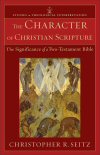
Christopher Seitz illuminates the two-testament character of Scripture and examines its significance for the contemporary church. He explicates the canonical interpretation project of Brevard Childs, interacts critically with current interest in the New Testament’s use of the Old Testament, and addresses an issue of perennial concern: how to hear both testaments as Christian witness. This volume will be useful for biblical studies scholars and grad students, and will be utilized by professors and students in biblical studies, theological interpretation of Scripture, and hermeneutics courses.
In this learned, astute, and graceful study, Seitz reflects on the significance of the two-testament form of the Bible for understanding the character of Christian Scripture. It is a commanding account of the matter from a master of biblical theology.
—John Webster, chair of systematic theology, University of Aberdeen
Beginning with the Bible’s unique character as a two-testament book, Seitz traces a theocentric path through issues of historicity, the final form of the canon, the providential location of the church’s exegetical task, the distinctiveness of the Old Testament’s voice, the rule of faith, contemporary Anglican debates, and more. A work of maturity and grace, this is Seitz’s best book yet—necessary reading both for its answers and, equally important, its questions.
—Matthew Levering, professor of religious studies, University of Dayton
What does it mean for the Christian Bible to have two testaments? Christopher Seitz, the foremost proponent of the canonical approach today, demonstrates how this deceptively simple question leads us to the heart of the challenge of reading the Bible theologically. Incisive in its criticisms, sound in its proposals, and ecclesial in its concerns, this is an exhilarating contribution to biblical theology. Required reading for anyone trying to think clearly about how to read Scripture in and for the church.
—Nathan MacDonald, reader in Old Testament, University of St. Andrews
In The Character of Christian Scripture, Seitz carries forward the work of Brevard Childs and his canonical approach to the theological interpretation of Scripture. In contrast to some recent hermeneutical proposals that read the Old Testament in a restricted way only through the lens of the New Testament, Seitz argues that the rich, diverse, and unique theological resources of the Old Testament should be allowed their own integrity in dialogue with the witness of the New Testament. Seitz rightly argues that the Christian Bible is unique in its bi-testamentality and thus requires a correspondingly unique theological hermeneutic as it testifies to the Triune God of Christian faith.
—Dennis Olson, Charles T. Haley Professor of Old Testament Theology, Princeton Theological Seminary
Seitz has long been blazing an exciting trail in thinking through the theological reality of a single, two-testament Bible. Here—in vigorous, challenging, and learned argumentation—he brings his reflections to a magnificent maturity and shows a way beyond the too-facile formulae of relating Old and New that have ultimately stripped the Old Testament of its power and substance as God’s living Word. Among the volume’s many gifts is Seitz’s convincing reassessment of the character of the early church’s ‘rule of faith’ in reading Israel’s Scriptures and the emerging New Testament—a key demonstration of how the peculiarity of maintaining a Bible of two distinct witnesses held ‘in accord’ can open up and guard a complexity and richness of Scriptural meaning. Seitz’s rigorous book constitutes a major contribution to both theological and practical hermeneutics that should fruitfully reorient the church’s reading of the Bible.
—Ephraim Radner, professor of historical theology, Wycliffe College, University of Toronto
Christopher R. Seitz is a professor of biblical interpretation at Wycliffe College, University of Toronto. He previously taught at the University of St. Andrews and Yale University. Seitz is the author or editor of numerous books, including Figured Out, Prophecy and Hermeneutics, The Goodly Fellowship of the Prophets, and commentaries on Isaiah 1–39 and 40–66.
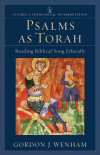
The Psalms are the most-read part of the Old Testament, but their importance for ethics has often been overlooked. However, the Psalms offer some of the most potent ethical instruction in the Bible. In this volume, renowned Old Testament scholar Gordon Wenham examines the source of the Psalms’ power, reflects on their main ethical themes, and shows how they function as prayers that change us. Wenham makes an important contribution to biblical scholarship and breaks new ground in discussions of Old Testament ethics, yet he writes accessibly, making this book invaluable for students in Old Testament or ethics courses, scholars, and pastors alike.
In Torah as Story Gordon Wenham showed how biblical narrative texts, little used by ethicists, can inform Christian moral teaching. Here he applies the same idea to the Psalms, equally seldom used in building a biblical ethics. He shows the huge potential of the Psalter to shape our moral insight.
—John Barton, Oriel and Laing Professor of the Interpretation of the Holy Scripture, University of Oxford
Wenham charts a fresh new course in studying the Psalms, asking readers to go beyond simply using them haphazardly in worship contexts as songs. Rather, Wenham urges us to appropriate the Psalms at a deeper level as a means of instruction (Torah), full of doctrine and ethical guidelines for life. This book is a rich delight, and I heartily recommend it to the scholar, pastor, and layperson alike.
—David M. Howard Jr., professor of Old Testament, Bethel Seminary
While the Psalms are a regular source of our thinking about theology, prayer, and worship, less attention has been given to what they have to say to guide our ethics. That gap has now been filled by Gordon Wenham’s careful reading of the Psalter to uncover its various moral voices. With particular attention to the way the law is taken up in the Psalms and to the ethics of prayer, Wenham identifies features of the Psalter that have to do with justice, compassion, the poor, violence and retribution, and the capacity for these prayers to commit the one praying to various perspectives and modes of behavior. And major attention is given to how the Psalter’s theology and ethic reverberate throughout the New Testament. An important contribution to both ethics and our insightful reading of the Psalms.
—Patrick D. Miller, Charles T. Haley Professor of Old Testament Theology, Princeton Theological Seminary
As increasing scholarly attention is given to Old Testament ethics, Gordon Wenham has become one of our most reliable guides. Having already directed attention to the neglected area of narrative texts and their moral significance, he now gives us a detailed treatment of the Psalms and their importance for Old Testament ethics. He makes such a clear case for the ethical centrality of Israel’s Psalter that we wonder how so many before him failed to see the ways in which ethics are shaped by the prayers and liturgies of a worshiping community. We are deeply in his debt.
—Bruce C. Birch, emeritus professor of biblical theology, Wesley Theological Seminary
After publications on how to appropriate Old Testament law and narrative for ethics, Wenham turns his attention to the Psalter. He embeds its ethical impact in the liturgy, explores its particular contribution to ethical formation, and connects its views with the rest of the biblical canon. This is a welcome and wonderfully profound and expansive study of a neglected area in the field of Old Testament ethics.
—M. Daniel Carroll R., distinguished professor of Old Testament, Denver Seminary
Gordon J. Wenham is a tutor in Old Testament at Trinity College, Bristol, England, and emeritus professor of Old Testament at the University of Gloucestershire. He is the author or editor of numerous books, including Story as Torah and commentaries on Genesis, Leviticus, and Numbers.
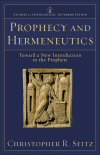
This volume offers a contemporary look at the study of Isaiah and the 12 Minor Prophets. Seitz explores fundamental questions of hermeneutics, the canon, and the Prophets as a bridge between the Testaments.
In the first section, Seitz delivers an insightful account of the history of the genre, looking at the impact of modern critical methods and the influence of Gerhard von Rad. In particular, Seitz is concerned about unintended consequences of the tradition-historical approach, especially the separation of the Prophets from their canonical context. As an alternative, he makes the case for a “figural” reading that takes seriously the Prophets’ association with other portions of the canon while maintaining their individual integrity.
The second section offers three exegetical essays in which Seitz explores the themes and hermeneutical approach developed in the first half of the volume.
This volume introduces an original and fruitful approach to the study of the Prophets, one that takes seriously the questions of both exegesis and hermeneutics.
Chris Seitz is one of the most insightful and creative biblical theologians working in the field today. In this book he shows us how traditional historical-critical readings have brought us to an impasse and then marks out a bold new path with his own proposal to take the canonical form of prophetic literature seriously. No one will look at the prophetic corpus in the same way after being tutored by Seitz.
—Gary Anderson, Hesburgh Professor of Catholic Theology, University of Notre Dame
It is rare when reviewing a book to recognize that a profound paradigm shift is being proposed that deeply affects how the Old Testament prophets are to be understood. Building on over two decades of probing, critical exegesis, Christopher Seitz now offers a magisterial overview of the entire field and outlines a new and brilliant hermeneutical synthesis of biblical prophecy that restores the centrality of the canonical Scriptures to the church.
—Brevard S. Childs, Sterling Professor of Divinity, emeritus, Yale University Divinity School
Building on the long history of prophetic introduction and interpretation, Seitz offers a new way of viewing the prophets. He takes the realities of time and history with utmost seriousness but also attends to the hermeneutical implications of the present form of the prophetic books. The future of theological interpretation of Scripture depends on such breakthroughs as Seitz offers in these pages. We will have to read the prophets differently henceforth.
—Patrick D. Miller, Charles T. Haley Professor of Old Testament Theology, Princeton Theological Seminary
Seitz has offered a fresh and bold proposal for understanding the formation and theological significance of prophetic literature. In rich dialogue with Gerhard von Rad and building on recent scholarly research . . . Seitz discerns a process of ‘figural integration’ in prophetic literature. Prophetic words were, in his judgment, fulfilled, not in some simplistic fashion, but over the course of time and, ultimately, in the New Testament. All those interested in prophetic literature and the character of Scripture will find this volume both challenging and useful.
—David L. Petersen, Franklin Nutting Parker Professor of Old Testament, Emory University
This is a highly interesting book. Christopher Seitz has long followed in the footsteps of Gerhard von Rad. Now he is taking a further step: beyond tradition-history toward the final, canonical form of the biblical text. He deals with the problems involved and demonstrates this new approach utilizing the prophetic literature . . . He shows in detail how historical questions about the different books within the Twelve are useful and even necessary but that they must finally move into an understanding of the text in its final form. Therefore he calls his approach ‘canonical-historical.’ It can be expected that this book will cause a vivid methodological discussion.
—Rolf Rendtorff, emeritus professor of Old Testament, University of Heidelberg
Christopher R. Seitz is a professor of biblical interpretation at Wycliffe College, University of Toronto. He previously taught at the University of St. Andrews and Yale University. Seitz is the author or editor of numerous books, including Figured Out, Prophecy and Hermeneutics, The Goodly Fellowship of the Prophets, and commentaries on Isaiah 1–39 and 40–66.
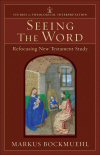
At a time of deep disagreements about the nature and purpose of academic biblical studies, Markus Bockmuehl advocates the recovery of a plural but common conversation on the subject of what the New Testament is about.
Seeing the Word begins with an assessment of current New Testament studies, identifying both persistent challenges and some promising proposals. Subsequent chapters explore two such proposals. First, ground for common conversation lies in taking seriously the readers and readings the text implies. Second, Bockmuehl explores the text’s early effective history by a study of apostolic memory in the early church.
All serious students of the Bible and theology will find much of interest and much to discuss.
Witty, sure-footed, and erudite, Markus Bockmuehl’s Seeing the Word is a gift to all who care about the future of New Testament studies. Though severe in his diagnosis of the field’s present crisis, Bockmuehl is heartening and enlightening in his account of how scholars today can reconstitute the study of the New Testament in an intellectually coherent and theologically fruitful way, without sacrificing the genuine gains of recent decades. By highlighting the integrative potential of New Testament study from the perspective of its implied readers and Wirkungsgeschichte, Bockmuehl models an approach whose historical interest is broad enough to encompass the New Testament’s historic identity as Christian Scripture and whose theological concern is confident enough to dare public conversation about truth.
—R. Kendall Soulen, professor of systematic theology, Wesley Theological Seminary
This is a timely prophetic plea for an ‘evangelical catholic reading of the text (of Scripture) in our own time.’ Every page crackles with the tension created by dialogue between systematic and historical-critical perspectives. The author’s amazingly broad learning is worn lightly in this accessible book, written with an elegance few can match. At last, the circle has been squared: it is possible to take Scripture as God’s address to us without ducking awkward historical questions.
—Graham Stanton, Lady Margaret’s Professor of Divinity, emeritus, University of Cambridge
Markus Bockmuehl’s Seeing the Word offers fresh possibilities for reading biblical texts in their historic role as the church’s Scripture. There is something to be learned on every page of this study, but the book is especially persuasive in arguing the case for an integrated reading of Scripture that overcomes the specious dichotomy between historical and theological issues and in demonstrating that theological exegesis can draw from and contribute to both the church and the academy. Whether one’s interests lie primarily with historical questions or with theological ones, readers will find no guide more capable and learned.
—Marianne Meye Thompson, George Eldon Ladd Professor of New Testament, Fuller Theological Seminary
In this important work, Bockmuehl deploys his wide knowledge both of the world of the early church and of the history of modern New Testament scholarship. His diagnosis of the contemporary state of New Testament studies is acute, and his recommendations for future directions are suggestive and important.
—Richard Bauckham, emeritus professor of New Testament studies, University of St. Andrews
Markus Bockmuehl’s Seeing the Word is essential reading for understanding the confusing state of play in contemporary New Testament studies. His trenchant essays offer us fresh ways of ‘seeing’ the relation between history and theology. Bockmuehl’s constructive proposals address a range of crucial issues: the New Testament’s formation of its implied readers, the significance of the Jewishness of the New Testament, the reception history of the New Testament texts, and the hermeneutical significance of the canon. In short, Bockmuehl sees the big picture and offers a penetrating, critical perspective on the unexamined assumptions of the field in which he works. On every page he stimulates historically informed reflection about the testimony of the earliest Christian witnesses. Most of all, he calls us to contemplate anew the identity of Jesus of Nazareth, the real-world, Jewish figure to whom these witnesses testify.
—Richard B. Hays, George Washington Ivey Professor of New Testament, The Divinity School, Duke University
Markus Bockmuehl is professor of biblical and early Christian studies at Keble College, University of Oxford. He previously taught at the University of Cambridge and the University of St. Andrews. Bockmuehl is the author or editor of numerous books, including Paradise in Antiquity: Jewish and Christian Views and Redemption and Resistance: The Messianic Hopes of Jews and Christians in Antiquity.
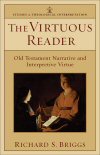
This volume offers a rich and thought-provoking portrait, or series of portraits, of the virtues required to read the Old Testament well. Biblical scholar Richard Briggs provides an exegetical exploration of “interpretive virtue” by carefully reading five Old Testament passages that reflect core virtues: humility, wisdom, trust, charity, and receptivity. The result is an example of theological interpretation that demonstrates the interplay between text and reader. Briggs approaches the biblical text with academic rigor and precision while maintaining an openness to the formative intentions of the biblical writers.
Situated in the Old Testament, though embracing the entire Christian canon, The Virtuous Reader breathes life into essential questions older than the rabbis and the church’s mothers and fathers. With sensitivity, the author invites us to consider those happy and healthy dispositions that Scripture itself elicits from those who would understand it. His learning is comprehensive, engaging not only ‘the usual suspects’ but also interpreters as varied as Wittgenstein and Mark Twain. Most important, by his gentle incisiveness Richard Briggs models the virtues of which he writes. A higher compliment than that I cannot render.
—C. Clifton Black, Otto A. Piper of Biblical Theology, Princeton Theological Seminary
This is a thorough-going, compendious critique of recent scholarship on readerly virtues as a condition of exegetical probity. Richard Briggs has given us ways to think coherently about achieving that trust in Scripture as Word of God that the text itself enjoins, yet without descending into a naivete that would undermine the ‘tough-minded’ critical virtues. A ‘state of the question’ study—and a contribution of great value.
—David Lyle Jeffrey, distinguished professor of literature and the humanities, Baylor University
A terrific book! Briggs significantly advances the conversations about biblical interpretation and Christian character through his rich exegetical studies and his philosophical and theological insights. This book should be read by biblical scholars, theologians, ethicists, and pastors alike.
—L. Gregory Jones, professor of theology, Duke University
Richard Briggs combines sophisticated theological hermeneutics with close attention to the biblical text and a probing interaction with the literature of biblical commentary, both ancient and modern. The result is immensely readable—fresh discussions leading to readings of the Old Testament that are both memorable and persuasive.
—Walter Moberly, professor of theology and religion, Durham University
This fascinating contribution focuses on the question, what kind of reader should we be in order to read the Bible well? Extremely well informed both about hermeneutics and philosophical conceptions of virtue, Briggs aims to show connections between the act of reading and the character of the reader. The Old Testament itself, he argues, not only implicitly projects an ideal virtuous character within its texts but also gives clues to the kinds of virtues expected of the reader. It is a most welcome addition to any scholarly and pastoral library on the Old Testament.
—Gordon McConville, professor of Old Testament theology, University of Gloucestershire
Richard S. Briggs is a lecturer in Old Testament and director of biblical studies at Cranmer Hall, St. John’s College, Durham University. He is the author of Words in Action: Speech Act Theory and Biblical Interpretation and Reading the Bible Wisely.
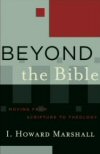
Applying scriptural insight to contemporary issues is one of the most important, yet most difficult, tasks that the church faces. The Bible, though written long ago, can speak authoritatively to contemporary ethical, doctrinal, and practical issues. Respected author I. Howard Marshall offers guidance for this perennial task in Beyond the Bible.
Using a "principled approach," Marshall moves from Scripture itself to contemporary understanding and application of Scripture. He examines how principles can be established from Scripture, whether explicitly or implicitly, and explores how the continuing development of insight can provide us with guidelines for the ongoing task of developing and applying Christian theology. Responses from Kevin Vanhoozer and Stanley Porter are included. Students and scholars of the Bible and theology will be interested in this latest work from I. Howard Marshall, and it offers an accessible approach to a perennial topic of concern that pastors, church leaders, and interested laity will appreciate.
I. Howard Marshall is emeritus professor of New Testament exegesis and honorary research professor at the University of Aberdeen. He is the author or editor of numerous books, including New Testament Theology: Many Witnesses, One Gospel, The Gospel of Luke in the The New International Greek Testament Commentary (13 vols.), The Epistles of John (NICNT), and A Critical and Exegetical Commentary on the Pastoral Epistles in the International Critical Commentary Series (59 vols.).
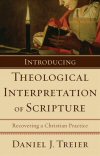
Introducing Theological Interpretation of Scripture: Recovering a Christian Practice
- Author: Daniel J. Treier
- Publisher: Baker
- Publication Date: 2008
- Pages: 160
In the wake of the schism during the past two centuries between biblical studies and theology, a new movement has developed, seeking to bridge this modern gap. This hermeneutical movement, which hearkens back to aspects of pre-critical interpretation, has been labeled the theological interpretation of Scripture (TIS) and focuses on the contexts of canon, creed, and church. While the trend is in its infancy, it is rapidly gaining momentum.
This is an introduction in the best sense of that term. With uncommon clarity and grace, Treier provides students of theological interpretation with a reliable and appropriately critical map of the terrain. Because Treier is both generous in his treatment of others’ work and thoughtful in presenting his own views, students will find him an enlightening and wise guide.
—Stephen E. Fowl, professor of theology, Loyola College, MD
With an impressive mastery of the secondary literature of this new field, Treier shows how the disciplines of historical, systematic, and practical theology play into theological interpretation of Scripture. Treier suggests, like many in this new movement, that a recovery of ancient Christian practices and postures toward Holy Scripture opens the theological imagination and allows for fresh readings, informed by historical criticisms but not captured by them.
—Kathryn Greene-McCreight, associate priest, St. John’s Episcopal Church, New Haven, CT
Many voices today clamor for the recovery of theological interpretation, from many corners and for diverse reasons. For those concerned with the significance of the church for reading Scripture, and the significance of Scripture for the church, this is a renaissance most welcome. So many different voices, though, can leave us confused—not only on the finer points of the discussion, but even about its most basic question: What is theological interpretation? We need a map, and this is precisely what Daniel Treier has provided: a map that will be as useful to those already engaged in the conversation as it is crucial for those trying to gain their first bearings.
—Joel B. Green, professor of New Testament interpretation, Fuller Theological Seminary
Daniel Treier is one of the brightest scholars working at the intersection of Scripture, hermeneutics, and theology in the evangelical academy today. Here he offers a masterful survey of the landscape and shows how evangelicals can join with Catholic scholars and others in moving the discussion forward.
—Timothy George, dean, Beeson Divinity School
Daniel J. Treier (PhD, Trinity Evangelical Divinity School) is associate professor of theology at Wheaton College. He is the author of Virtue and the Voice of God: Toward Theology as Wisdom and the coeditor of several books, including The Beauty of God: Theology and the Arts and the award-winning Dictionary for Theological Interpretation of the Bible.
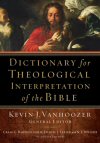
Dictionary for Theological Interpretation of the Bible
- Editor: Kevin J. Vanhoozer
- Publisher: Baker
- Publication Date: 2005
- Pages: 896
Dictionary for Theological Interpretation of the Bible is a groundbreaking reference tool that seeks first of all to marry the tasks of exegesis and theology with the goal of theological interpretation of Scripture—that is, interpretation that has recovered a focus on the subject matter of Scripture: the nature and activity of God and the gospel. Second, it aims to provide a guide to understanding various interpretative approaches and a tool for evaluating them in light of this goal.
The dictionary covers a wide range of topics related to biblical interpretation with both depth and clarity. Topics include the theological interpretation of individual books of the Bible, issues of hermeneutics, various biblical interpreters and interpretative communities, and the interplay of interpretation with various doctrines and doctrinal themes. The contributors represent a diverse range of theological backgrounds and interpretative approaches and are experts in their respective fields.
A landmark volume for the church’s engagement with Scripture. It will be a basic resource on the role and use of the Bible.
—Christianity Today
In this remarkable dictionary, the Bible is reclaimed as a book of and for the church. I predict that when the history of theology of our time is written what Vanhoozer, Bartholomew, Treier, and Wright have done will be seen as a watershed. In this book theology returns to its source, that is, Scripture.
—Stanley Hauerwas, Gilbert T. Rowe Professor of Theological Ethics, Duke Divinity School
Both the academy and the church have awakened to the need to bring exegesis and theology back into relationship with one another. This dictionary, partly because it covers such a wide range of topics, provides a useful resource for those engaged in learning how to read the Bible, with all its historical particularity, as a word from God to his people of this generation.
—Douglas Moo, Blanchard Professor of New Testament, Wheaton College
This dictionary will be an exceedingly useful addition to the library of every Christian, professional and lay, who wants to learn skills for reading the Bible more insightfully. Scholarly yet accessible, historically grounded yet forming us for the future, broadly global in perspective yet enabling readers to see the theological implications of biblical books and study methods for their own lives and their communities, the articles gathered here equip us all to know the triune God more thoroughly and to offer Christian alternatives to our world more gracefully and purposefully. This is an outstanding resource presented by many of my favorite teachers.
—Marva J. Dawn, teaching fellow in spiritual theology, Regent College
Kevin J. Vanhoozer (PhD, University of Cambridge) is research professor of systematic theology at Trinity Evangelical Divinity School in Deerfield, Illinois. He is the author or editor of many books, including Is There a Meaning in This Text? and Everyday Theology: How to Read Cultural Texts and Interpret Trends.